
ICAS Bulletin (online ISSN 2836-3418, print ISSN 2836-340X) is published every other week throughout the year at 1919 M St NW, Suite 310, Washington, DC 20036.
The online version of ICAS Bulletin can be found at chinaus-icas.org/bulletins/.

– On March 13, the U.S., the UK and Australia announced they would join forces to develop nuclear-powered submarines to counter China’s military expansion in Asia-Pacific. Australia will acquire nuclear submarine technology with the help of the U.K. and the U.S.
– China raised serious concerns and requested clarification from the U.S. following reports that Taiwan’s leader Tsai Ing-wen plans to meet with U.S. House Speaker Kevin McCarthy during a transit in the United States.
– It has been confirmed that the U.S. House Speaker Kevin McCarthy and Taiwan’s President Tsai Ing-wen will meet in California rather than in Taipei, reportedly due to concerns about China’s military aggression as the U.S. increases contingency planning.
– U.S. intelligence chief Avril Haines said to lawmakers that China seeks to avoid escalating tensions with the U.S. and favors stable relations, despite its efforts to enhance its global economic and military power.
– U.S. officials questioned whether Chinese-made cranes at U.S. ports, including some used by the military, could potentially be used for surveillance or sabotage given that some cranes contain sophisticated sensors that could track information about shipment status.
– On March 2, senior Pentagon official on Indo-Pacific security Ely Ratner said that China would not invade Taiwan by the end of the decade due to the high cost while expressing confidence in the U.S.’s ability to deter Beijing from attacking the island.
– On March 1, The U.S. approved a $619 million sale of munitions for Taiwan’s F-16 fighter jets, including anti-radiation and air-to-air missiles, aimed at enhancing Taiwan’s defense capability amid rising tensions over the island’s status. Three days later, China reportedly flew 17 J-10 and 4 J-16 fighter jets in the southwestern part of Taiwan’s air-defense identification zone.
– On March 2, Mark Gallagher, head of the House Select Committee on the Chinese Communist Party, warned during the panel’s first meeting that the U.S. is running out of time to confront China. He emphasized the need for urgency, describing the competition with China as an “existential struggle” with fundamental freedoms at stake.
Associated News References:
“Biden Unveils Landmark Submarine Deal With Australia and Britain,” The New York Times, March 13 [Paywall]
“Taiwan Confirms President’s U.S. Stopover,” The Wall Street Journal, March 9 [Paywall]
“China ‘seriously concerned’ by Taiwan president ‘transit’ plans amid reported US trip,” Reuters, March 8 [Paywall]
“Speaker Kevin McCarthy to meet Taiwan’s president in US to avoid China’s ire,” Financial Times, March 8 [Paywall]
“China wants to avoid escalation with U.S. and favors stable relations, U.S. spy chief says,” NBC News, March 8
“Pentagon Sees Giant Cargo Cranes as Possible Chinese Spying Tools,” The Wall Street Journal, March 5 [Paywall]
“China Sends Fighter Jets Near Taiwan as US Approves Arms Sale,” Bloomberg, March 2 [Paywall]
“High Cost of Taiwan Invasion Will Dissuade China, Pentagon Official Says,” USNI News, March 2
“US Selling Taiwan $619M Worth of F-16 Munitions,” The Defense Post, March 2
“New U.S. committee on China warns of ‘existential struggle’ in first hearing,” The Japan Times, March 1 [Paywall]

– U.S. Commerce Secretary Gina Raimondo is considering a trip to China this spring to de-escalate tensions and engage with China to benefit the U.S. On March 8, China’s Ministry of Commerce expressed openness to a visit from U.S. Secretary of Commerce Gina Raimondo, stating that trade ties are “very important” despite ongoing tensions.
– China announced a major overhaul to strengthen its technological self-reliance and tighten its grip on financial regulation to align with Chinese President Xi Jinping’s priorities and aim to counter U.S. technology restrictions and rising geopolitical tensions.
– On March 7, China’s leader Xi Jinping called on the country’s private sector to “fight” alongside the Communist Party, criticizing the U.S. for containing and suppressing China in an all-round way.
– Chinese solar companies reported U.S. solar panel imports resuming after gridlock, benefiting from clearer rules regarding the Uyghur Forced Labor Protection Act implementation.
– The Biden administration plans to issue an executive order to limit American investment in advanced technologies with national security applications to prevent China from acquiring military capabilities.
– Chinese foreign ministry spokesperson Mao Ning indirectly blamed the U.S. for causing financial difficulties in developing countries such as Pakistan amid a war of words between the two countries over developing country debt.
– On March 2, the U.S. Commerce Department added 28 Chinese entities and individuals to its Entity List, citing potential national security risks, including alleged dealings with an Iranian electronics firm.
– A survey by the American Chamber of Commerce in China found that fewer U.S. companies view China as a top investment destination due to disruptions caused by China’s strict anti-COVID measures and geopolitical tensions. It revealed U.S. companies’ rising pessimism about their financial prospects in China, with over half stating negative profits last year.
– The U.S. has begun consultations with allied nations to discuss possible new sanctions on China if Beijing decides to provide military support to Russia.
Associated News References:
“China ‘open’ to visit by US commerce chief Gina Raimondo, trade ties ‘very important’ despite tensions,” South China Morning Post, March 8 [Paywall]
“China shakes up government to counter financial risks and US tech restrictions,” CNBC News, March 8
“Xi Jinping hits out at US as he urges China’s private firms to ‘fight’ alongside Communist Party,” CNN News, March 7
“U.S. solar panel imports from China grow, alleviating gridlock, officials say,” Reuters, March 6 [Paywall]
“Biden expected to tighten rules on US investment in China,” AP News, March 4
“US Commerce Secretary Gina Raimondo Is Considering a China Trip This Year,” Bloomberg, March 2 [Paywall]
“China Blames US’s ‘Radical Fiscal Policy’ for EM Debt Troubles,” Bloomberg, March 2 [Paywall]
“U.S. Export Limits Target 28 Chinese Entities, Citing Alleged Ties to Iranian MiChina Blames US’s ‘Radical Fiscal Policy’ for Poor Countries Debt Troubles – Bloomberglitary,” The Wall Street Journal, March 2 [Paywall]
”Fewer American Companies See China as an Investment Priority,” The Wall Street Journal, March 1 [Paywall]
“Exclusive: US seeks allies’ backing for possible China sanctions over Ukraine war,” Reuters, March 1 [Paywall]
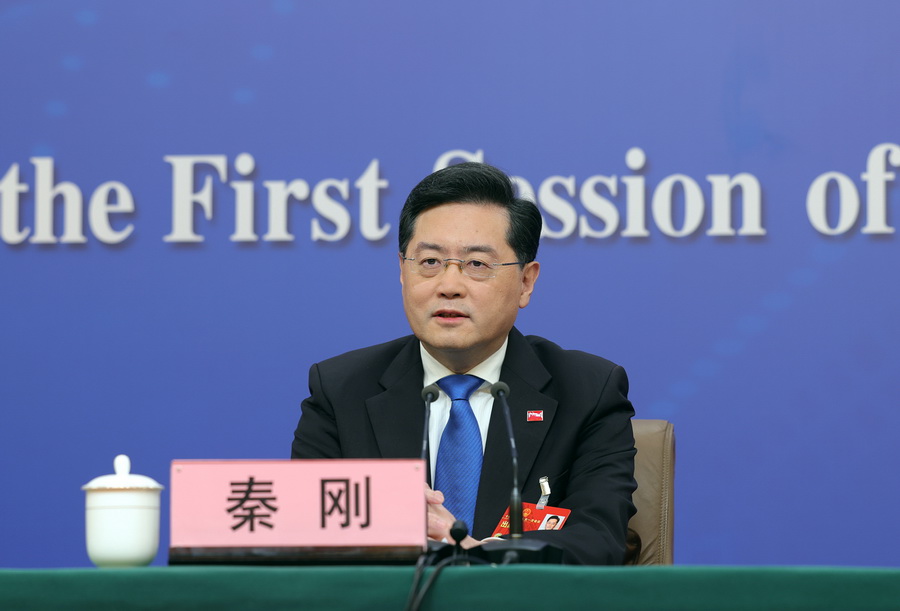
– U.S. National Security Advisor Jake Sullivan said that President Joe Biden plans to hold a phone call with President Xi Jinping after the Two Sessions gathering has concluded, though a date has yet to be set. The two have not spoken since November 2022.
– China’s Ministry of Finance explained that the Chinese government is seeking to largely increase diplomatic and governmental budgets and hardening public stances with the United States.
– Chinese President Xi Jinping directly accused “Western countries led by the U.S.” of “bringing unprecedented severe challenges to our country’s development” in a rare explicit reference to the U.S.
– Major Chinese companies that were targeted by U.S. sanctions, particularly semiconductor and technology companies, were celebrated during the opening of the Two Sessions in Beijing.
– Chinese President Xi Jinping has called for private firms and large entities to maintain a united front against U.S. sanctions.
– Chinese Foreign Minister Qin Gang directly addressed the U.S. to “hit the brakes” as bilateral tensions continue to rise. Minister Qin Gang also asked the U.S. to explain its plan of the “destruction of Taiwan,” adding pressure to the Taiwan question.
– Chinese Foreign Minister Qin Gang warned that the rising U.S.-China tensions risk blowing away any previous guardrails in the bilateral relationship, marking a new stage of heightened tensions.
Associated News References:
“Biden Expected to Have Call With China’s Xi Jinping But No Date Set,” Bloomberg, March 14 [Paywall]
“China ups diplomatic offensive with drastic increase in budget – and hardened stance on US,” CNN News, March 9
“China accuses U.S. of containment and warns of potential conflict,” NPR News, March 7
“Conflict with China is inevitable unless the U.S. changes course, Beijing’s new foreign minister warns,” CNBC, March 7
“About 100 Chinese Congress delegates chosen from U.S.-targeted companies,” Nikkei Asia, March 7 [Paywall]
“Chinese Foreign Minister Qin Gang tells US to ‘hit the brakes’ as relations continue to deteriorate,” South China Morning Post, March 7 [Paywall]
“Foreign Minister Qin Gang demands US explain ‘destruction of Taiwan’ plans,” South China Morning Post, March 7 [Paywall]
“Xi’s Frustration at Biden Grows With Warning of Conflict,” Bloomberg, March 7 [Paywall]
“China’s Xi Jinping Takes Rare Direct Aim at U.S. in Speech,” The Wall Street Journal, March 6 [Paywall]
“China Warns US Risks Catastrophe With Moves to ‘Contain’ Beijing,” Bloomberg, March 6 [Paywall]
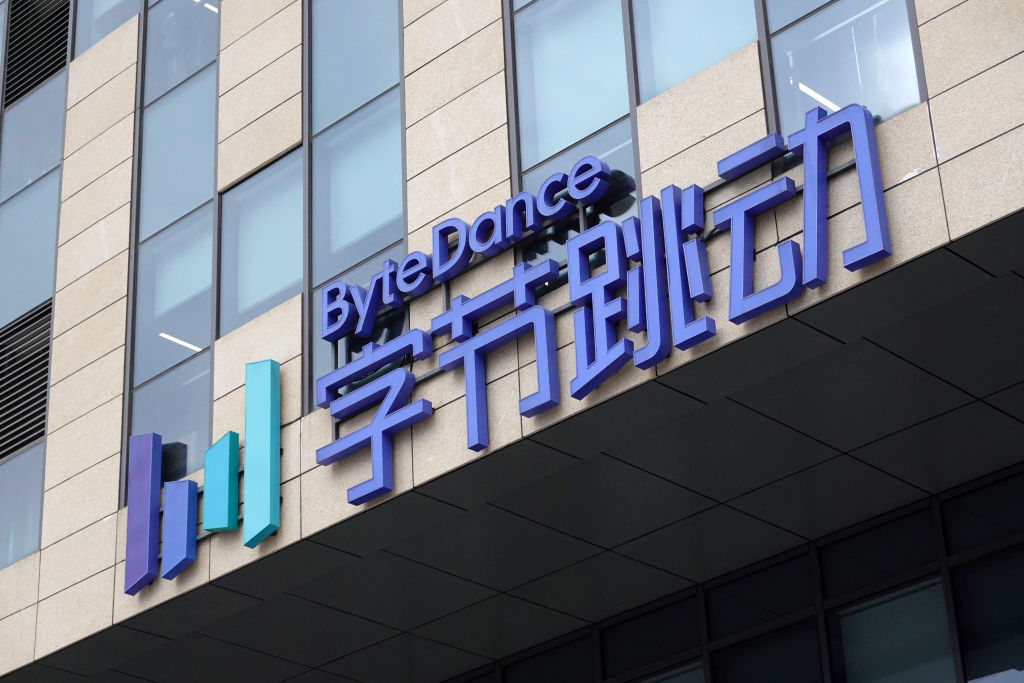
– U.S. Senator Marco Rubio introduced new legislation that seeks to cancel Ford Motor’s deal to utilize technologies from Chinese battery company CATL.
– 12 U.S. Senators sponsored new bipartisan legislation, created by the U.S. Senate Intelligence Committee, that would allow for the expansion of President Biden’s ability to prohibit TikTok on a nationwide level; a legislation the President previously endorsed.
– U.S. Senator Josh Hawley has been in-contact with a former ByteDance employee who stated that TikTok overstates its separation from China-based Bytedance and utilizes software that is not fully secure.
– Chinese technology chip imports slowed by 27% by volume during January and February 2023.
– Nvidia Corp, Advanced Micro Devices Inc., and other large technology firms are investigating halting sails to Inspur Group Ltd. following Linspur’s addition to a U.S. export blacklist.
– Chinese Vice-Premier Liu He told top-tech industry executives that China must maintain a united “whole nation” approach to semiconductor production, as U.S. export controls increase their effect on the industry.
– The Biden administration announced new export restrictions for dozens of Chinese tech firms, adding 28 more to the Commerce Department’s Entity List.
– China’s military industries are looking to begin building China’s first constellation of low-Earth orbit (LEO) satellites this year, attempting to catch up to U.S. firm Starlink.
– According to the Australian Strategic Policy Institute, China now has a “stunning lead” in 37 out of 44 critical and emerging technologies, as the U.S. and allied nations slip on global research output goals.
Associated News References:
“A former TikTok employee tells Congress the app is lying about Chinese spying,” The Washington Post, March 10 [Paywall]
“Rubio takes aim at planned Ford US battery plant using Chinese technology,” Reuters, March 9 [Paywall]
“US senators unveil bipartisan bill empowering Biden to ban TikTok and other services,” CNN News, March 8
“Senator’s TikTok whistleblower alleges data abuses,” Axios, March 8
“China’s chip imports slump 27 per cent in the first 2 months of 2023 as US sanctions bite,” South China Morning Post, March 7 [Paywall]
“US tech firms grapple with latest curbs on China’s Inspur,” Al Jazeera, March 7
“Biden Administration Backs New TikTok Bill, Wants Swift Passage,” Bloomberg, March 7 [Paywall]
“US Lawmakers Step Up Push to Ban TikTok With Bill This Week,” Bloomberg, March 5 [Paywall
“China doubles down on ‘whole nation’ approach to chip self-sufficiency as US tightens export controls,” South China Morning Post, March 3 [Paywall]
“US Expands Crackdown On China With Export Ban on Inspur, BGI,” Bloomberg, March 2 [Paywall]
“China gears up to compete with SpaceX’s Starlink this year,” Reuters, March 2 [Paywall]
“China leads US in global competition for key emerging technology, study says,” Reuters, March 1 [Paywall]
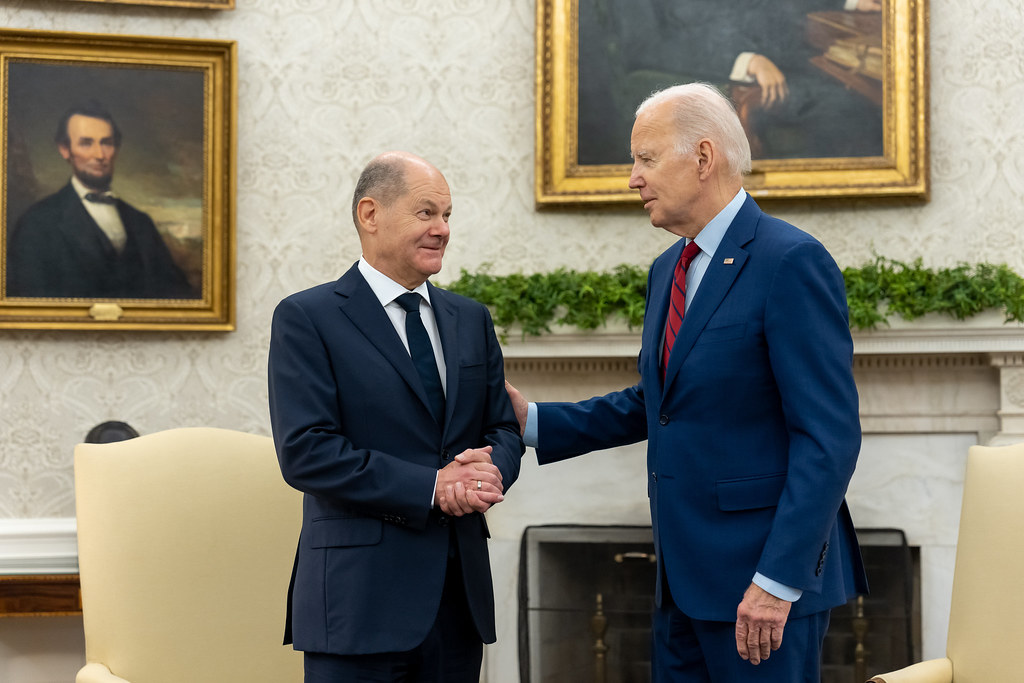
– Iran and Saudi Arabia have agreed to re-establish diplomatic relations and reopen state embassies following talks in Beijing, indicating a large shift from U.S. influence in the region.
– U.S. intelligence chief Avril Haines told lawmakers that the Chinese government is seeking to avoid further escalation of bilateral tensions and emphasized China’s desire for a more stable relationship.
– White House National Security spokesperson John Kirby told reporters that the U.S. does not see a future path of conflict with China, despite Chinese Foreign Minister Qin Gang’s warning of possible conflict with Washington.
– U.S. President Biden met with German Chancellor Olaf Scholz to discuss united measures to keep Western support homogenous amid rising tensions with China and Russia.
– U.S. Department of State spokesperson, Ned Price, stated he expected “additional calls and engagements” between the U.S. and China in the coming weeks.
– U.S. Treasury Department Deputy Assistant Secretary Robert Kaproth visited China to hold technical discussions to improve the ability of bilateral trade cooperation.
Associated News References:
“Iran and Saudi Arabia agree to restore relations,” Al Jazeera, March 10
“China wants to avoid escalation with U.S. and favors stable relations, U.S. spy chief says,” NBC News, March 8
“White House says it sees no change in US-China relations,” Reuters, March 7 [Paywall]
“Biden Meets With German Chancellor Amid Concerns Over Ukraine and China,” The New York Times, March 3 [Paywall]
“US expects calls, engagements with China in coming weeks,” Reuters, March 2 [Paywall]
”US Treasury official visited China last week – sources” Reuters, March 1 [Paywall]
“China is fully reopening to tourists after three years of border restrictions,” CNN News, March 14
“Asian Startups’ Confidence in U.S. Banking Wanes After SVB Panic,” The Wall Street Journal, March 13 [Paywall]
“China slams Manila again over closer US military ties, warns against ‘drawing wolves into the house,’” South China Morning Post, March 12 [Paywall]
“To Counter China, U.S. and Allies Seek to Make Militaries ‘Interchangeable,’” The Wall Street Journal, March 12 [Paywall]
“G-7 should form united front versus China: ex-U.S. trade official,” Nikkei Asia, March 10
“Nanjing university suspends lecturer after comments about imported food, US guns,” Radio Free Asia, March 10
“U.S. House unanimously backs COVID origins information declassification,” Reuters, March 10 [Paywall]
“Republicans Push Lab Leak Theory on Covid’s Origins, but Lack ‘Smoking Gun’,” The New York Times, March 8 [Paywall]
“US to relax COVID testing rules for travelers from China,” ABC News, March 7
“U.S. to lift covid testing requirements on travelers from China,” The Washington Post, March 7 [Paywall]
“Americans Continue to View China as the U.S.’s Greatest Enemy,” Gallup, March 6
“U.S. firm’s subsidiary sold electronics to Chinese defense firm linked to spy balloon program,” NBC, March 6
“Shein’s Lead Under Fire as Chinese-Owned App Tops US Charts,” Bloomberg, March 5 [Paywall]
“What Happened to China’s Mars Rover?,” The New York Times, March 1 [Paywall]
March 6 hosted by Center for Strategic and International Studies
March 6 hosted by Foreign Policy
March 7 hosted by Wilson Center
March 10 by Brookings
March 9 hosted by East-West Center
March 10 hosted by Brookings
March 15 hosted by Harvard Fairbank Center for Chinese Studies
March 17 hosted by Wilson Center
March 21 hosted by Center for Strategic and International Studies
March 23 hosted by The U.S.-China Economic and Security Review Commission
March 29 hosted by Center for Strategic and International Studies
by Jessica Martin
March 9, 2023

Key Takeaways:
April 13, 2023
9:30-11:00am EDT (GMT+4)
What does the suspension of the Arctic Council meetings mean for Arctic Council observers? Will Norway, who will take over the chairmanship in May 2023, make any progress to break through the current ties? Will the debate on the concept of an “Arctic Council 2.0” gain support among non-Arctic states who have a deep interest in Arctic governance? Will non-Arctic countries such as China, Japan, South Korea, India, and Singapore — which have growing Arctic interests and have contributed much to Arctic research —welcome the opportunity for them to establish a more solid role in this region’s affairs? How will the observers adapt to a changing Arctic Council?
On Thursday, April 13, 2023, join the ICAS Maritime Affairs Program and University of Alberta China Institute in a joint virtual discussion on these vital questions. The full list of scholars, providing perspectives from the five Asian observers of the Arctic Council—China, Japan, South Korea, India, and Singapore—will be released soon.
On Friday, March 9, 2023, Senior Fellow Sourabh Gupta discussed China’s short- and medium-term growth prospects on CGTN.
On Thursday, March 5, 2023, Senior Fellow Sourabh Gupta interviewed by China Daily alongside the Two Sessions meeting
On Friday, March 3, 2023, Senior Fellow Sourabh Gupta discussed the Ukraine conflict and U.S.-German relations on CGTN America’s The Heat.
On Thursday, March 2, 2023, Senior Fellow Sourabh Gupta was quoted in a China Daily article on U.S.-China relations alongside the Two Sessions meetings.
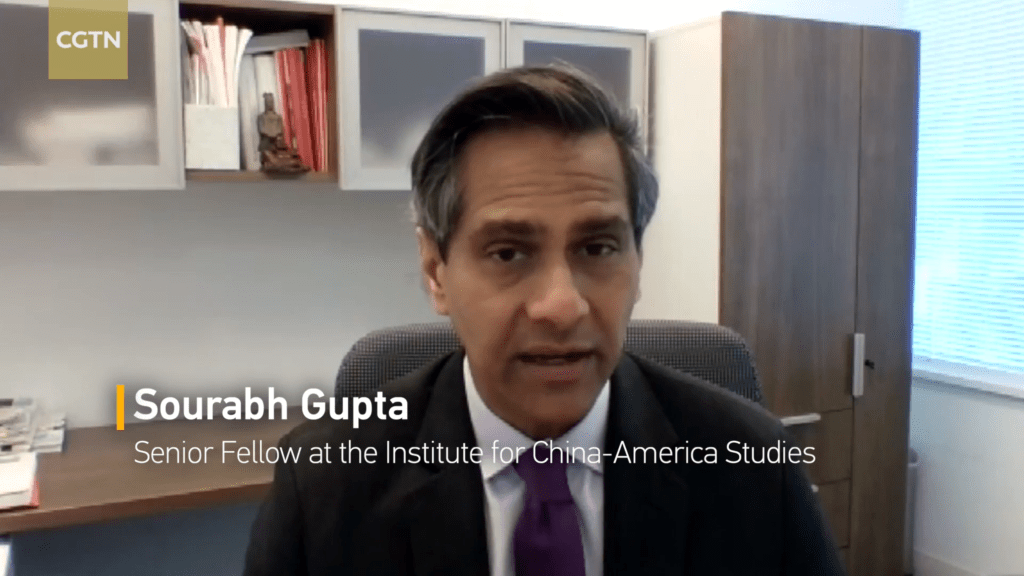
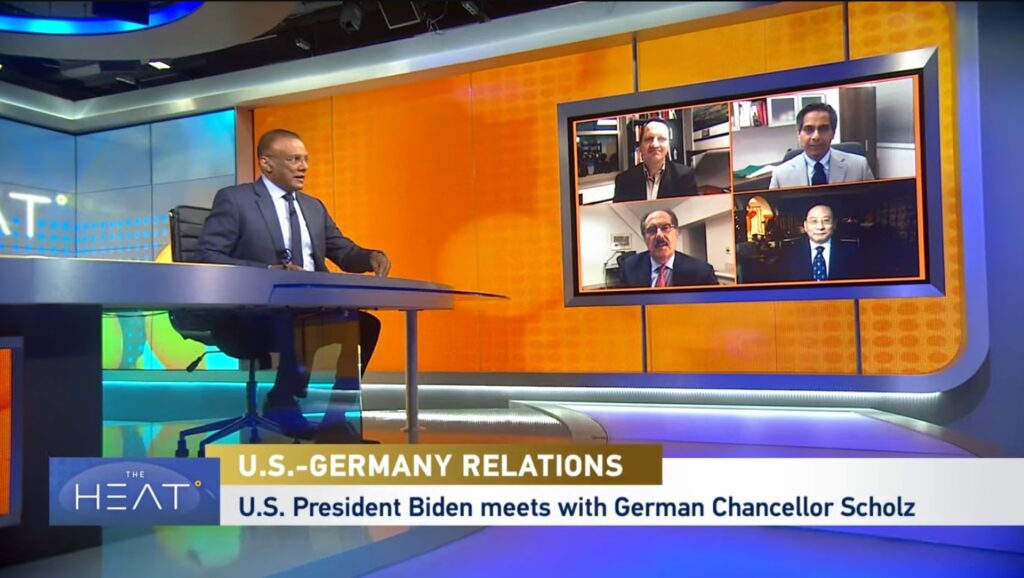

The Institute for China-America Studies is an independent nonprofit, nonpartisan research organization dedicated to strengthening the understanding of U.S.-China relations through expert analysis and practical policy solutions.
1919 M St. NW Suite 310,
Washington, DC 20036
icas@chinaus-icas.org
(202) 968-0595
© 2025 INSTITUTE FOR CHINA-AMERICA STUDIES. ALL RIGHTS RESERVED.